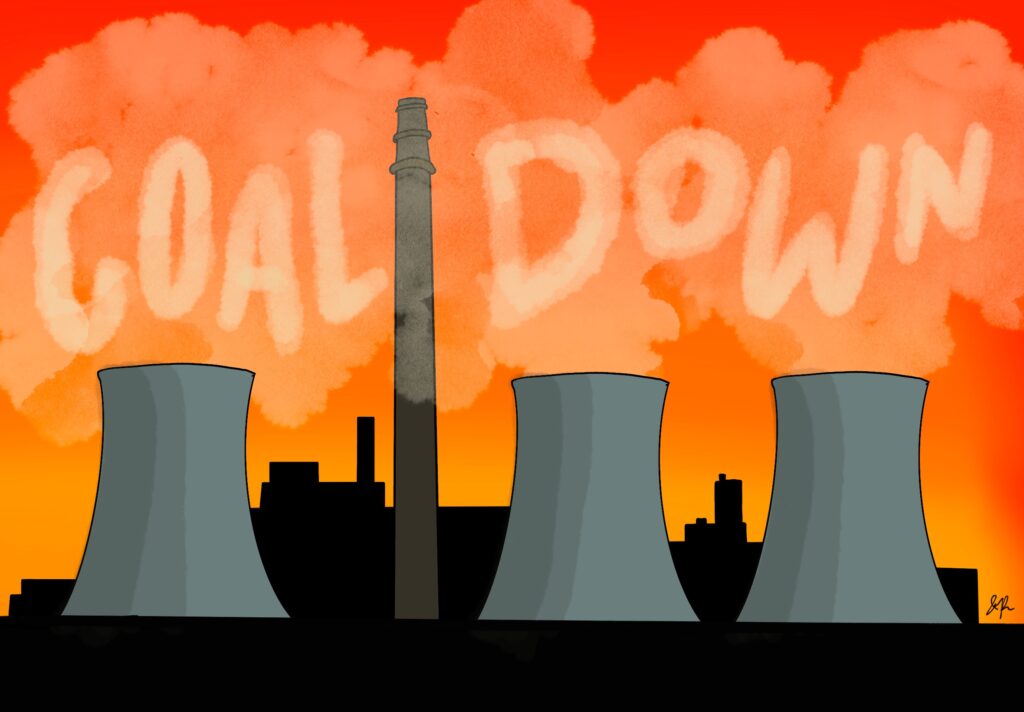
An article published by the Associated Press on April 25 2024 stated that the Environmental Protection Agency (EPA) enforced stricter carbon emission capture measures but was met with backlash. As part of the Biden administration’s agenda to cut back on planet-warming pollution, the EPA warned that coal plants must either take action to capture a certain percentage of their carbon emissions by a certain time or shut down.
Coal plants that plan to stay open beyond 2039 would have to cut or capture 90% of their carbon dioxide emissions by 2032. Plants that expect to retire by 2039 would face a less stringent standard but still would have to capture some emissions. Coal plants set to retire by 2032 would not be subject to the new rules.
These standards are set with the resolve to reduce what would otherwise be 1.38 billion metric tons of carbon pollution, a measurement equivalent to the emissions of 328 million cars that run on gas annually. As AP notes, fossil fuel-fired electric plants are the nation’s second-largest contributor to climate change. If the proper changes take place, carbon pollution can be eliminated from the electricity sector by 2035 and from the economy by 2050.
Similar measures go for wastewater pollution from coal-fired power plants. As AP notes,
“The rule issued Thursday forces owners to safely close inactive coal ash ponds and clean up
contamination.” The goal here is to tackle toxic wastewater pollution by 660 million pounds per year and simultaneously/consequently undo the previous administration’s dismantling of over
100 clean air, water, etc. policies. Of course, the moral concern here is that we are actively and continuously bringing pollution into the world, not to mention this problematic and immoral because of the negative effects on the health and well-being of millions of humans as well as wildlife.
However, as with most things where money and other forms of personal profit are involved, the naysayers have much negativity to spread. From Rich Nolan, president and CEO of the National Mining Association, to Jim Matheson, CEO of the National Rural Electric Cooperative Association, whose association also represented 900 local electric cooperatives across the country, are not willing to cave in without involving the court, calling EPA’s practice “unlawful.”
The Argument Against It
Nolan points out that the new EPA regulations have ignored the reality of the presence of energy in everyday life and that forcing “well-operating coal plants that repeatedly come to the rescue during times of peak demand” to close is a “reckless plan.”
Matheson also argues is that the regulations are clearly unrealistic and unachievable, and can also face legal issues. He points out issues with electricity reliability; the plan would depend on advanced technologies, which have not caught on yet or are not working fast enough.
The Argument For It
Unsurprisingly, the EPA’s latest action is supported by many environmental groups and people, such as David Doniger, climate and clean energy expert at the Natural Resources Defense Council, and Frank Holleman, attorney with the Southern Environmental Law Center. Their philosophical argument stems from a utilitarian sort of idea that the cutback on carbon emissions is helping a greater number of people get to a better, happier, less painful place in life.
As the article states, “EPA…will provide hundreds of billions of dollars in climate and health benefits, measured in fewer premature deaths, asthma cases and lost work or school days.”
Not only that, a more ecocentric argument is simply that animals and wildlife are being harmed left and right, up and down, because of actions by human beings. Coal ash, a waste stored near power plants, is a dangerous substance that, when leached into the ground, drinking supplies, rivers, and/or streams, can harm people and kill massive fish populations.
Coming to a Consensus
Unsurprisingly, racism, sexism, social class hierarchy, and so many more forms of discrimination are still present in our society – if anything, even more apparent now. The companies being targeted by the EPA are “rural” and “local” electric cooperatives (as stated and implied by Matheson’s title) and workers (as implied by Nolan’s title). This means these companies may be run by families or are small – or even medium – startups already struggling financially and just trying to do what they can to make a little money. This also means that, practically, it’s not fair for the EPA to solely target poor people to do better because of their circumstances.
The solution? EPA should go after the large companies and big brands – the oil and coal barons and the companies that support them. I don’t see why that’s not doable; after all, if even the EPA is gaining in some profitable way from those companies, the world might as well be doomed anyway.
The views and opinions expressed are those of the authors and do not necessarily reflect nor represent the Earth Chronicles and its editorial board.




